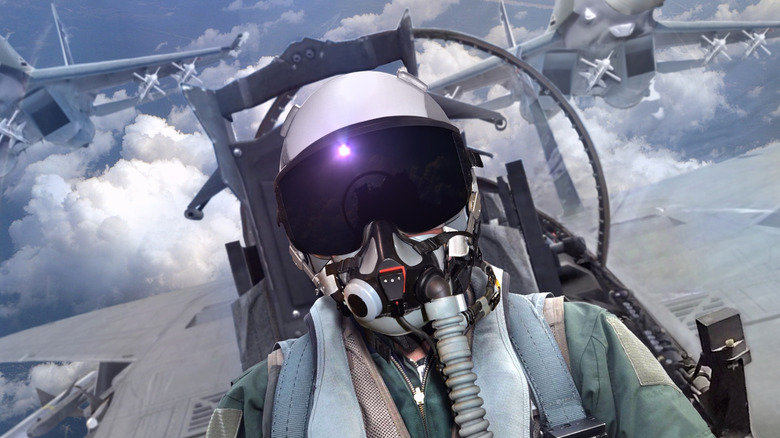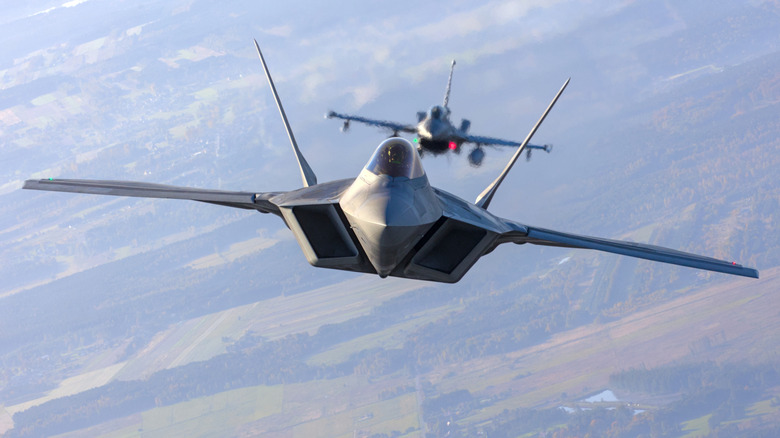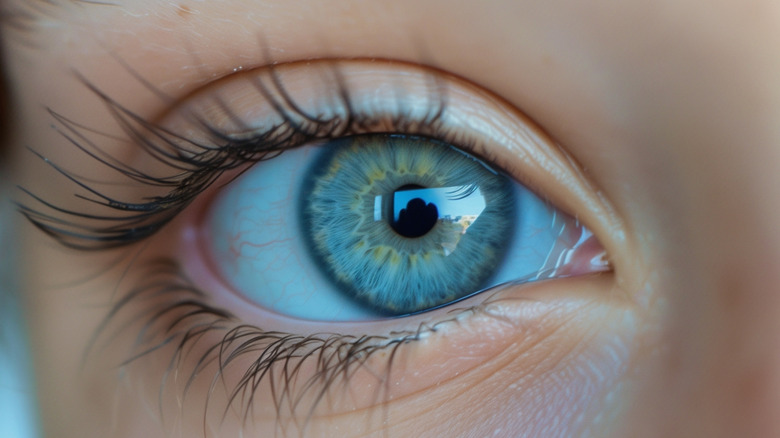Does The US Military Accept Fighter Pilots Who Wear Glasses?
While you don't have to be among the most legendary fighter pilots in history to fly for the United States military, not just anyone can hop into the cockpit of a jet and fly off on a mission. To be a military pilot requires rigorous training, extensive knowledge of flying and military procedures, and the physical ability to handle the wear and tear of high-speed flight. After all, the United States military sets forth demanding requirements for those interested in getting behind some flight controls. However, there are aspects that one might think of as a disqualifying factor, but aren't at all.
For instance, if someone wears glasses, one might think this would prevent them from becoming a pilot. Excellent vision is important when zipping through the skies, and, of course, a helmet needs to fit properly for protection. In reality, someone is able to become a pilot for the United States military if they have to wear glasses. This is true for the Air Force as well as the Coast Guard, Marines, Navy and the Army. However, the fact that they'll likely have to deal with issues like glasses moving, fogging up, and others could make them more of a nuisance than one would hope.
Still, even though hitting the runway with lenses on could be absolutely unbearable for some, it's entirely doable nonetheless. While the military does accept people who wear glasses to be pilots, there are strict vision requirements for each branch that not all can meet.
Glasses-wearers with especially poor vision won't fly
As great as glasses can be, they're not miracle inventions. Glasses are largely only capable of correcting specific ailments, such as nearsightedness, farsightedness, and astigmatism. More serious conditions like macular degeneration, retinal damage, and others won't improve much no matter the type of lenses used. Thus, if someone wears glasses to help more surface-level issues, yet their vision is compromised and will continue to be by more extensive conditions, odds are such dreams of becoming a military pilot won't come true. Even with glasses, prospective pilots have to meet strict vision requirements to serve their country.
Each branch outlines specific vision requirements for its pilots. Per the United States Air Force, its pilots must have normal color vision — presumably without the aid of hit-or-miss color blind glasses — near visual acuity of 20/30 without correction, and distant visual acuity of no less than 20/70 in each eye, correctable to 20/20. As far as the eyes' refraction level, it can't be any worse than + or – 8.0. On top of all of that, they must also meet other accommodation and astigmatism requirements.
For the Army, distant visual acuity can be no worse than 20/50 and each eye should be correctable to 20/20. The Navy requires visual acuity no lower than 20/40 in each eye, correctable to 20/20, along with specific distant visual acuity thresholds depending on the service group. It's also noted that depending on the specific position one is hoping to attain as a military pilot, additional vision thresholds may be required. Fortunately for those who don't want to fly with glasses, the U.S. military does assist help. All it takes is some eye surgery.
Don't want to fly with glasses? The military has you covered
If you are someone who has joined the U.S. military, wears glasses, and doesn't want to wear them forever, you're in luck. As it turns out, the military itself is willing to cover your surgery to improve your vision and, ideally, do away with your glasses. The Warfighter Refractive Eye Surgery Program, initiated over two decades ago, makes it possible for those in all branches of the military to receive LASIK or PRK surgery. The Womack Army Medical Center lists the requirements to be approved for the program, as well as the steps to follow if you meet those requirements.
Meanwhile, if one decides to undergo LASIK or a similar surgery before joining the military, they have to wait a year after surgery before they can be considered for service. This is likely to ensure the surgery was successful. It should also be noted that corrective eye surgery doesn't guarantee entry into specific positions, notably piloting aircraft. Such surgery could disqualify someone from these positions outright, so make sure to consider all options on the table before going under the knife.
A lot goes into training as a fighter jet pilot in the modern era, so all facets of the body need to be ready. Even if you need glasses to help your vision, there's still a possibility you'll be able to soar through the clouds.


